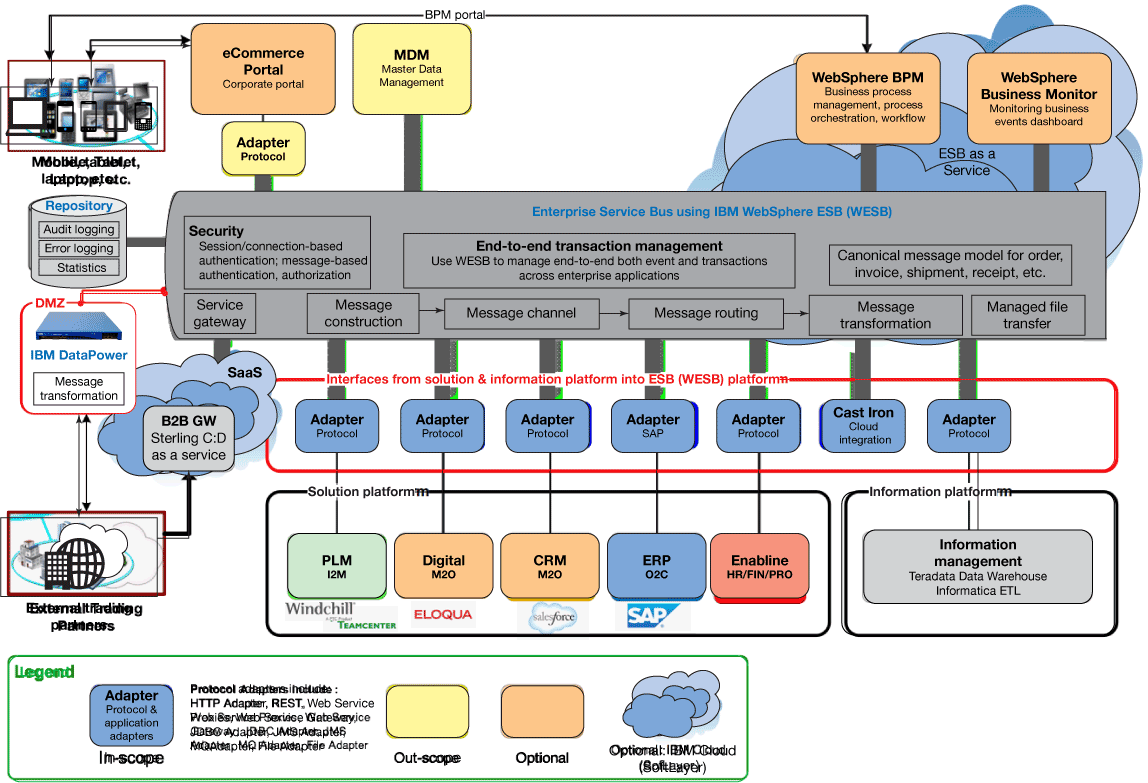IPASS Architecture - Taking enterprise integration to the next level
Integration platform as a service (IPaaS) is a new integration solution model that uses cloud computing technology. It is elastic and scalable and uses a consumption-based model to achieve major cost savings. An enterprise can achieve a significant return on investment by choosing this solution rather than using a corporate-owned data center. This consumption-based model is calculated on the actual usage, therefore it achieves further cost savings when the CPU, memory, storage, software, and integration services are idle.
Consumption-based model
The essence of the consumption-based model in IPaaS is that the service platform always knows who is using which services, for how long, and when. The primary external metric for the IPaaS consumption model is the use of IPaaS services. Since IPaaS offerings are pre-engineered to provide price smoothing across hardware variables, and also includes considerations for operational and application management support, all of the costs associated with IPaaS are rolled up to the IPaaS service level and associated with the consumption of those services.
IPaaS solutions can be architected to function in either a single-tenant or multi-tenant environment. In situations where a client is looking to deliver a multi-tenant SaaS-based solution to their customer, the underlying IPaaS integration architecture must support that. This is particularly true with inter-enterprise API designs. Even when the solution is clearly single-tenant, IPaaS services are typically enterprise level and must support a range of constituent lines of business and their trading partners. As a result, IPaaS supports multiple views to report on service consumption.
IPaaS service consumption is recorded and reported for two primary purposes:
- Monitoring overall capacity usage in business terms, thereby allowing proper forecasting of capacity
- Providing the ability of charge back or other cost recovery schemes based on the use of IPaaS services
To support this consumption-based model, IPaaS includes the technical capability to apply reporting analytics to business events, correlate participation in business events across multiple IPaaS components, and identify the complete business context around each business event.
Rapid elasticity
Demand can vary for a number of reasons. For example:
- Seasonal or event-specific business patterns may drive spikes and valleys in production usage
- Test usage due to back-end changes, where major system of record enhancements require a full set of end-to-end acceptance and performance tests including IPaaS
IPaaS is specifically architected to expand and contract rapidly to changes in demand. This is attainable because the IPaaS environment builds on the features and functions of the IaaS and PaaS cloud-offerings, so there is no re-inventing these underlying services for IPaaS. An IPaaS service request for more capacity will automatically call on the underlying IaaS and PaaS cloud provisioning services. In addition, the IPaaS catalog has pre-engineered the provisioning request specifically to the IPaaS functional services. This is consistent with the overall philosophy of cloud architecture and open source initiatives like Cloud Foundry, Docker, and OpenStack. This IPaaS pre-engineering also provides for price smoothing across hardware variables, and also includes considerations for operational and application management support.
For details pls check
https://developer.ibm.com/articles/cl-ipaas-next-generation-of-esb2/

